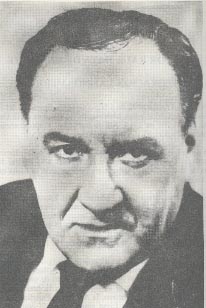- Víctor Raúl Haya de la Torre
Infobox Politician
name = Víctor Raúl Haya de la Torre

width = 200px
height = 200px
caption = Photo
small_
office = President of the Constitutional Assembly
term_start = 1978
term_end = 1979
predecessor =
successor =
constituency =
majority =
office2 =
term_start2 =
term_end2 =
predecessor2 =
successor2 =
constituency2 =
majority2 =
birth_date = birth date|1895|2|22|df=y
birth_place =Trujillo ,Peru
death_date = death date and age|1979|8|2|1895|2|22|df=y
death_place =Lima
party =American Popular Revolutionary Alliance (APRA)
relations =
spouse =
civil partner =
children =
residence =
occupation =Lawyer
religion = Political party /Roman Catholic
website =
footnotes =Víctor Raúl Haya de la Torre (
22 February 1895 –2 August 1979 ) was aPeru vian political leader who founded theAmerican Popular Revolutionary Alliance (APRA) political movement.Life
Haya de la Torre was born in the northern Peruvian city of
Trujillo . In 1913 he enrolled in theUniversidad Nacional de Trujillo to study literature, where he met and forged a solid friendship with the Peruvian poetCésar Vallejo . He then enrolled in theNational University of San Marcos inLima .He was instrumental in bringing the ideas of the Argentine University Reform movement (La Reforma) to San Marcos, and administrative reforms were instituted in 1919. Part of the reform movement was university extension programs, through which the university students hoped to reach the working classes.
To that end, Haya de la Torre founded the Universidades Populares Gonzalez Prada, night schools for workers, which according to some historians formed the foundation for the Partido Aprista Peruano.
In 1923 Haya de la Torre was exiled by the government of Augusto B. Leguía.On
7 May 1924 , while inMexico City , Haya de la Torre founded the APRA and the pan-Latin American movement known as "Aprismo". He returned to Peru in 1931 to run for President.That year, he was imprisoned for 15 months and his party was outlawed until 1934 and then also from 1935 to 1945. In 1945,
José Luis Bustamante y Rivero became president with APRA's support. Then, in 1948, some party dissidents revolted inCallao and APRA was again outlawed.In November of that year,
Manuel Odría seized power and forced Haya de la Torre to seek asylum in theColombia n embassy in Lima. Haya de la Torre was able to return to Peru in 1954 and his party was again legalized in 1956.However, he continued to live mostly abroad until 1962. He ran for president again, obtaining victory by a slim margin but not enough to be constitutionally elected. Then, a
military junta annulled the elections. There were new elections in 1963, but Haya was defeated in the vote.His party remained popular. In 1979 he became president of the
constitutional assembly , which drafted a newconstitution . OnJuly 12 , on his death bed, he signed the new constitution.Ideas
Haya de la Torre advocated a system of
Latin America n (or, to use his preferred term, "Indo-American)" solutions to Latin American problems. He called upon the region to reject both U.S.imperialism and Sovietcommunism .He favored universal
democracy , equal rights and respect for indigenous populations, andsocialist economic policies such asagrarian reform , based on the concept of communal land ownership, and state control of industry.Haya de la Torre advocated the overthrow of the land-owning oligarchies that had ruled Peru since colonial days, replacing them with an idealistic socialist elite. However, in exchange for attaining legal status for the party, he made opportunistic ideological swings to the right, and by the 1950s it had jettisoned most of its progressive, socialist ideals.
In addition, Haya de la Torre's single-handed dominance APRA resulted in pronounced sectarian and hierarchical traits, resulted in an exodus of some of APRA's most talented young leaders to the Marxist left.
Personal life
The Peruvian leader was best known for his lack of love interests. This may be resumed in his famous phrase uttered to APRA members: "El APRA es mi mujer y ustedes son mis hijos" ("The Apra is my wife and you [the members] are my children"), however, rumours of homosexuality scattered around the country during and after his life. His detractors frequently used this as a weapon against him, but his true orientation is straight.
Haya's first and middle given names "Víctor Raúl" are. combined, a popular boys' name among APRA members or sympathizers.
Quotation
External links
* [http://www.apra.org.pe/ APRA's official site]
* [http://www.latinamericanstudies.org/haya.htm More photographs of Víctor Raúl Haya de la Torre]ee also
*
Politics of Peru
*List of Presidents of Peru
Wikimedia Foundation. 2010.
